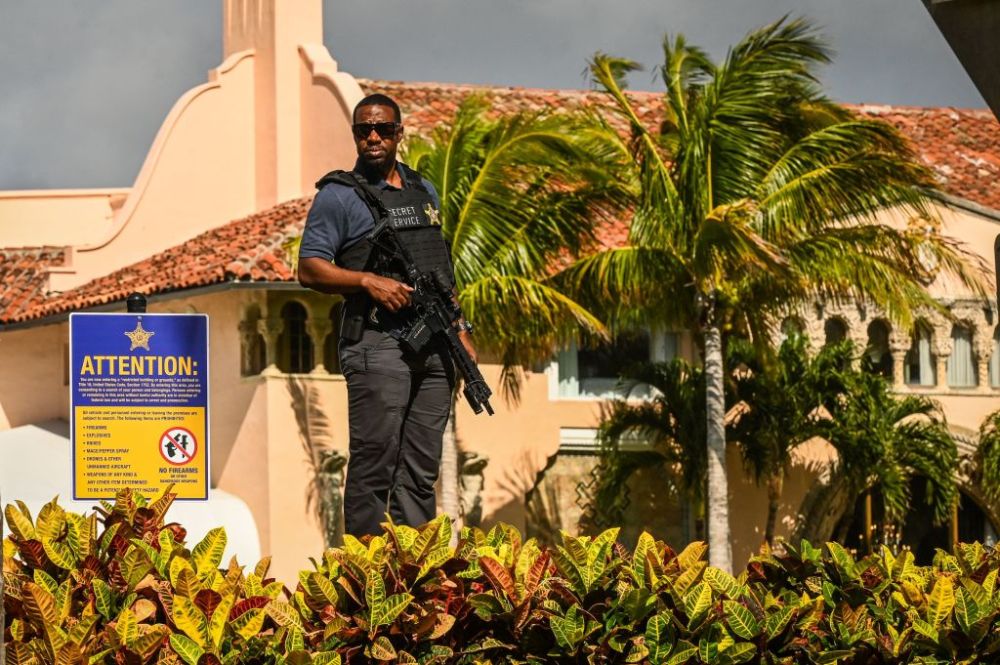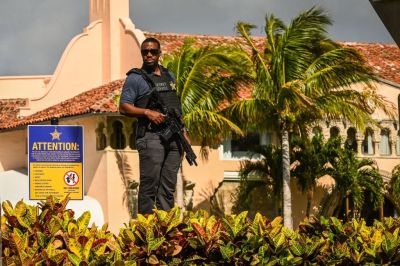Hello and happy Saturday. Had this been a normal week, I’d be joking about how you can predict when it’s going to rain by looking at our son’s baseball schedule, or tell you how our oldest was having a cool experience at Fort Knox this weekend with his ROTC battalion. But it was not a normal week, was it?
On Wednesday, media outlets reported that the Manhattan grand jury hearing evidence in District Attorney Alvin Bragg’s investigation of former President Donald Trump would not be meeting for the next month, putting off any potential indictment. Or not. The very next day, at about 5 p.m., the indictment dropped. The indictment is still sealed and we likely won’t know the specific charges until Tuesday, but reports indicate that Trump will face charges on more than 30 counts related to business fraud. He’s the first former president to be indicted, and, as we noted in The Morning Dispatch, the first to officially run afoul of law enforcement “since Ulysses S. Grant was arrested for speeding through Washington, D.C., in his horse-drawn carriage.”
Bragg’s investigation has centered around Trump’s alleged $130,000 hush-money payment during the final days of the 2016 campaign to adult film star Stormy Daniels. (Daniels’ allegations of a 2006 sexual encounter with Trump became public in 2018.) The investigation involves the most sordid allegations of the various inquiries into the former president, but also the least serious. Trump is also the subject of a grand jury investigation in Fulton County, Georgia, related to his attempts to overthrow the 2020 election, and special counsel Jack Smith is investigating the January 6 Capitol riot and whether Trump played any role in the attempt to prevent the certification of the election results.
And so it’s a messy situation. There are legal questions: Is the case too weak? Will Bragg’s novel theory that Trump’s payment amounts to a campaign finance violation be shot down? And there are political questions: Is the investigation an example of prosecutorial persecution? Might this actually help Trump with his supporters? What does it mean for 2004?
Readers, I have my opinions on the matter. But … I don’t have a ton of expertise. Fortunately, we have others who do. If you want to catch up on the news, don’t miss Friday’s Morning Dispatch.While we’re waiting on the charges, check out Price’s explainer on what Trump might be looking at. And Haley has the congressional reaction in Uphill (🔒).
Sarah has expressed her concerns about the investigation on Advisory Opinions and in her newsletter, and she wrote Friday morning after the indictment: “I am not suggesting that former presidents should be above the law, but they shouldn’t be below it either. No serious person has argued that a regular citizen has or would ever be charged under what appears to be New York’s novel legal theory being applied to Trump now—and certainly not seven years after the alleged crime was committed. Prosecutors may stretch the facts to indict people for more serious crimes or pressure them into a plea agreement, but stretching the law is more dangerous.”
In Boiling Frogs, Nick covers a few angles of the story all in one newsletter. He quotes lefty writers who are concerned about Bragg using “legal contortions” to charge Trump and that the whole effort smells of “an effort to find a crime.” And he warns that the indictment is going to rally the Trump cult, which doesn’t care whether the facts are true. And he saves a special condemnation for Florida Gov. Ron DeSantis, who announced he would not assist in any extradition request from New York (even though the Constitution doesn’t afford him that right and that it appears Trump will appear in court on his own). DeSantis is“taking a real risk, merely exploiting this opportunity to normalize the worst illiberal extrajudicial impulses of populists,” he writes.
We’ll have more to come as the charges are announced, Trump appears in court, and we see how the politics shake out. Stay tuned, and thanks for reading.
Our reaction to mass shootings follows a predictable script. Gun-control proponents call for more gun control and castigate those who offer “thoughts and prayers.” Gun-rights proponents point out that the problem is with the shooters, not the guns, cite statistics about how we don’t enforce the gun laws we have, and offer thoughts and prayers. One thing we don’t see often is responsible and well-informed journalism about firearms. And we had an unfortunate collison this week. On Monday, the Washington Post published a multipart series on the AR-15. Hours later, a shooter killed three students and three adults at a private Christian school in Nashville, Tennesee. Kevin deftly tackled both the WaPo series and the shooting. The WaPo ran a story that explored the AR-15’s power as a cultural symbol. Kevin acknowledged the truth of that, then called out some of the piece’s factual errors. And he noted that when it comes to terrorist actions like mass shootings, perpretrators are trying to send a message. “Our domestic terrorists pick up these weapons because of what the weapons say—or what the killers want them to say: You can hate me and you can fear me, but you cannot ignore me.” But he doesn’t blame just one side: “Making the scary black rifle the powerful cultural symbol it is today has been a collaborative effort between the people who are fascinated by such rifles and embrace them and the people who are fascinated by such rifles and detest them.” Kevin wrote a separate piece about the many, many mistakes in a different piece from the WaPo, on the alleged “uniquely destructive” capabilities of the AR-15.
The Wall Street Journal published a poll on Monday that showed a decline in traditional values like patriotism, religion, and having children. Nick, naturally, has thoughts in Boiling Frogs (🔒). With the caveat that, as pollster Patrick Ruffini pointed out, a change in methodology might have affected the results, Nick found some valuable insights. “The Poll really does seem like a skeleton key of sorts in unlocking the state of the right. If you regard younger Americans as foreign culturally in their alienation from traditional values like patriotism and religion and foreign intrinsically by race, origin, or sexual orientation, nationalism will appeal to you as a last-ditch attempt to protect your tribe’s pride of place as the march of time risks making your displacement irreversible.”
Teddy Ray is a student at Yale Law School, and he’s had a front row seat to progressive students shouting down speakers. So when a mob of students at Stanford Law Schoool sought to silence conservative federal juge Kyle Duncan a few weeks ago—and an associate dean intervened, only to confront Duncan–it got him thinking. While many critics of campus cancel culture ask, “What’s wrong with kids these days?” Ray doesn’t think it’s the kids at all—it’s the administrators. He draws a comparison between progressive mobs disrupting speakers and the Stanford Prison Experiment. In that study, a psychologist divided up a group of 24 students into prison guards and prisoners, and it took only two days before the guards, imbued with authority, started humiliating the prisoners. He argues that administrators, who not only tolerate but encourage mob-like behavior, have turned progressive students into prison guards who feel entitled to humiliate and degrade those with whom they disagree.
And here’s the best of the rest.
- What’s going on with the House’s Hunter Biden investigation? Harvest has all the details.
- Chris Stirewalt weighs in on academia, noting that since faculties are so overwhelmingly liberal, conservatives are likely to turn to other sources, not all of them reputable: “That’s how you get Charlie Kirk but no Edmund Burke.” If professors would just teach great conservative thinkers, it would improve the discourse for everyone.
- Does the House majority in 2024 run through New York? Republicans won some surprising races in 2022, and that has Democrats energized. Check out Dispatch Politics for the full story.
- In the G-File, Jonah tackles “bothsides-ism” by noting that Gwyneth Paltrow and Alex Jones are two very different people selling the same snake oil under different labels. It makes sense, trust me.
- On the pods: On Advisory Opinions, David French and Sarah look at why the conviction of Adnan Syed, whose case was featured on the Serial podcast, was reinstated. The gang convened an emergency Dispatch Podcast on Thursday after Trump was indicted. And all you need to know about Jonah’s solo Remnant is the headline: Trumpster Fire.







Please note that we at The Dispatch hold ourselves, our work, and our commenters to a higher standard than other places on the internet. We welcome comments that foster genuine debate or discussion—including comments critical of us or our work—but responses that include ad hominem attacks on fellow Dispatch members or are intended to stoke fear and anger may be moderated.
With your membership, you only have the ability to comment on The Morning Dispatch articles. Consider upgrading to join the conversation everywhere.